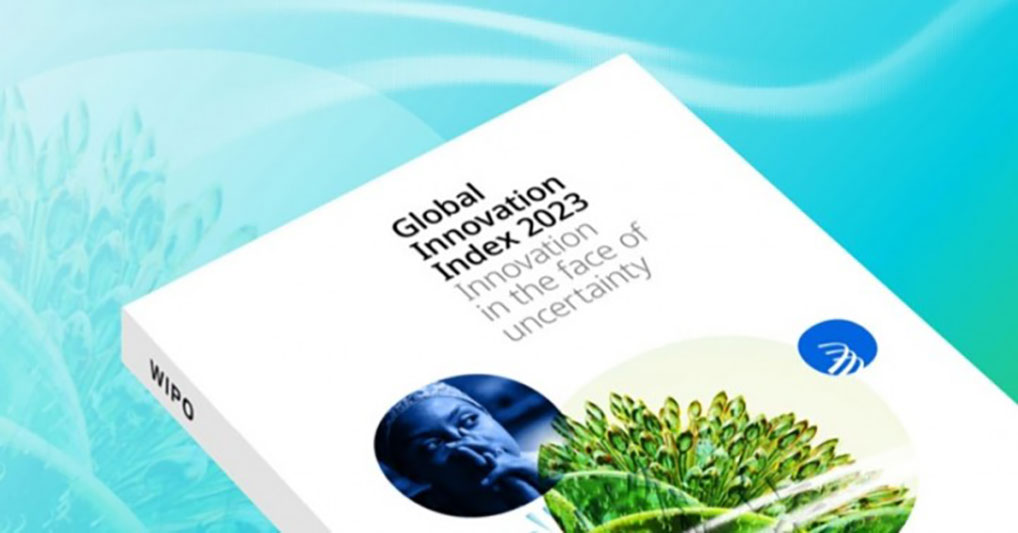
THE PHILIPPINES was named one of the top climbers of the decade following the release of the Global Innovation Index (GII) 2023, in which it placed 56th out of 132 economies, the World Intellectual Property Organization (WIPO) said.
This year’s edition of the GII put the Philippines up three spots with a GII score of 32.2 out of 100. Its ranking in 2022 had been 59th.
The index measures the innovation capacity of economies based on two sub-indices — innovation input and innovation output.
 In innovation input, the index gauges the ability of the economy to facilitate innovative activity in institutions, human capital and research, infrastructure, market and business sophistication.
In innovation input, the index gauges the ability of the economy to facilitate innovative activity in institutions, human capital and research, infrastructure, market and business sophistication.
On the other hand, the innovative output sub-index measures the economies’ ability to enable innovative activity based on knowledge and technology outputs and creative outputs.
The Philippines ranked 69th in innovation inputs, from 76th a year earlier. It ranked 52nd in innovation outputs, one place lower from 2022.
The Philippines received its top grades in business sophistication, knowledge and technology outputs, and market sophistication, while its weakest grades were in human capital and research, infrastructure, and institutions, WIPO said.
Among 37 lower-middle income economies, the Philippines’ innovation capability was ranked fourth just behind India (40), Vietnam (46) and Ukraine (55). It was 11th among 16 economies in Southeast Asia, East Asia, and Oceania.
Reacting to the results, Intellectual Property Office of the Philippines Director General Rowel S. Barba said that the Philippines needs to produce more knowledge assets to address the decline in innovation outputs.
“Filipinos need to urgently produce more knowledge assets that positively impact markets and society, in effect, reversing the decline of our innovation outputs to 52nd from 51st in 2022 and 40th in 2021,” Mr. Barba said.
“But we recognize that innovating in these times will also be challenging amid high inflation, monetary tightening policies and geopolitical tensions,” he added.
He said that the improved innovation ranking is a “welcome development” but added that “we have to continue being dissatisfied.”
“Dissatisfied not just in our current posture in the global innovation map but in the current way of things around us, whether products, solutions, systems, processes or practices,” he said.
“We need to develop among Filipinos a mindset that continuously innovates to challenge the norm until such a time that innovating becomes our norm,” he added.
Leonardo A. Lanzona, Jr., an economics professor at the Ateneo de Manila, said that the jump in ranking is mainly due to exposure to digital technology.
“A number of our workers are employed in online labor platforms which means that transactions are undertaken through the internet,” Mr. Lanzona said in an e-mail.
However, he said that the engagement does not mean that Filipino workers are better off than those in other countries as much of their work involves lower value-added activities and poor working conditions, which result in high underemployment.
“This means that we are not productively using our seemingly advanced exposure to these technologies. People are engaged in these transactions for the simple reason that they have no other option,” he added.
Rizal Commercial Banking Corp. Chief Economist Michael L. Ricafort said that the improvement may have to do with the further reopening of the economy.
He added that there are “no more large lockdowns since 2022” and “the final resumption of in-person schooling since August 2022 after being restricted for nearly 2.5 years (also helped improve) productivity and innovation,” Mr. Ricafort.
He added that the second-biggest business process outsourcing industry after India will also help drive innovation.
“The harnessing of technology and innovation to further strengthen its competitiveness in the higher end of the global supply and value chain would be required and inevitable … especially with the emergence of AI and the need to adopt the use of AI-related technologies,” he added. — Justine Irish D. Tabile



